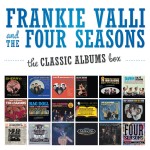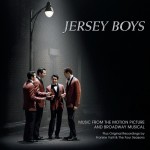In conjunction with this interview, one very fortunate reader is going to win a treasure trove of Four Seasons and Four Seasons-related music. The prize package includes:
Frankie Valli & the Four Seasons – The Classic Albums Box.This massive set includes 18 CDs of the albums that the group recorded between 1962-1992.
Jersey Boys: Music From the Motion Picture and Broadway Musical. Producer Bob Gaudio pulled together a compilation of original Four Seasons recordings and blended them with recordings by cast members from the musical, and the film for this collection.
Audio With a G: Sounds of a Jersey Boy, The Music of Bob Gaudio. This two-disc compilation includes songs that Gaudio wrote over the years. Aside from the Four Seasons, other artists in the collection include Frank Sinatra, the Walker Brothers, Diana Ross, and the Temptations.
To enter, send me an email with the name “Gaudio” in the subject line. In the body of the email put the answer to the following question along with your name and U.S. mailing address:
According to Jersey Boys, what Oscar-winning actor played a key role in introducing Bob Gaudio to the group that would become the Four Seasons?
If you feel inclined to put your answer in the comments section, please don’t. It won’t count as an entry.
The deadline for entries is on Friday, August 8, at 3:00 p.m. eastern daylight time. At that time I will choose one winner at random from all of the correct entries. Rest assured that your information will never be shared, and all emails will be deleted when the contest is over.
As anyone who has seen the Broadway musical or recent film Jersey Boys knows, Bob Gaudio was a key player in the hit making machine known as the Four Seasons. I had a chance to speak to Bob recently, and we covered as much of his legendary career as possible in the time we had.
Early on you were involved with a group called the Royal Teens which had a big hit with the song “Short Shorts.” Another member of that group was Al Kooper. Tell me how that all came together.
Al came in close to when I was leaving the group. He wasn’t on the record, that was Billy Dalton, and Billy Crandle, who went on to success with a group called the Knickerbockers, who had a hit record called “Lies.” Al played guitar, and we had lost our original guitar player for one reason or another. Al was from Brooklyn. I can’t quite remember the connection, but I guess I’ll take responsibility for helping him to jump into the business.
The Jersey Boys musical and film make much of the relationship between the Four Seasons and the mob, Angelo ‘Gyp’ DeCarlo in particular. As someone who wasn’t from the same neighborhood and came in later, were you initially put off when you realized what was going on?
That’s a very interesting question because early on I didn’t really know who Gyp was. It’s not like Gyp was in every bar we frequented. He was a presence in New Jersey obviously, and in the history of the Genovese family. I picked up a little more here and there, but by the time I really understood what was going on with him in particular, we were rocking and rolling. At that point we’d had “Sherry,” and “Big Girls Don’t Cry,” a couple of hits.
I remember reading an article about FBI transcripts. We were mentioned in the transcripts. Not in depth, just association, having been seen with him. The thing that struck me heavily was that the transcripts were about Gyp DeCarlo supposedly killing someone, in some wooded area of NJ. He was never brought up on charges for that to my knowledge, I’m just quoting what was in the FBI transcript that was printed somewhere. The only reason that I even looked at it was that someone said that we had been mentioned in this FBI thing.
So that was a shock. I’d like not to believe it, but I wouldn’t bet my life on it, no pun intended.
Initially you and the group were doing work as session singers. How did you go from being session singers to being the Four Seasons? What was the breakthrough there?
When we initially made our deal with Bob Crewe we got a salary of a certain amount per week. We did his session work, demos primarily, but you never know. In those days demos sounded like masters, and maybe they still do. We did that for a year or two. That was not our intent originally, but we were getting lots of information, and learning how to make records and so on.
At some point we finally said hey, that’s not what we signed up for, and if we don’t get a chance to get to bat for ourselves, we’re just going to move on. We were working at night in the clubs anyway, so we felt confident that we could survive. Bob Crewe acquiesced, and here we are.








Comments